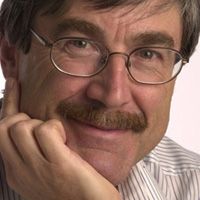My personal belief is that biologists tend to be uncompromising and reductionistic because they're still feeling somewhat insecure with their basic dogma, whereas physicists have three hundred years of secure foundation for their subject, so they can afford to be a bit more freewheeling in their speculation about these complex systems.
PAUL DAVIES, Regents' Professor and director of BEYOND at Arizona State University, is a theoretical physicist, cosmologist, astrobiologist, and author. He is the principle investigator of the Center for the Convergence of Physical Sciences and Cancer Biology, funded by the National Cancer Institute. Davies previously held academic appointments in the UK, at the Universities of Cambridge, London and Newcastle upon Tyne. He moved to Australia in 1990, initially as Professor of Mathematical Physics at The University of Adelaide. Later he helped found the Australian Centre for Astrobiology, based at Macquarie University, Sydney.
His research has ranged from the origin of the universe to the origin of life, and includes the properties of black holes, the nature of time and quantum field theory.
In addition to his research, Professor Davies is known as a passionate science communicator. He gives numerous public lectures each year throughout the world and has written twenty-seven books, both popular and specialist works, which have been translated into many languages. He writes regularly for newspapers, journals and magazines in several countries.
Among Davies's better-known media productions were a series of 45 minute BBC Radio 3 science documentaries. Two of these became successful books and one Desperately Seeking Superstrings, won the Glaxo Science Writers Fellowship. In early 2000 he devised and presented a three-part series for BBC Radio 4 on the origin of life, entitled The Genesis Factor. His television projects include two six-part Australian series The Big Questions and More Big Questions and a 2003 BBC documentary about his work in astrobiology entitled The Cradle of Life. He is the author of The Eerie Silence; The Cosmic Jackpot; and How to Build a Time Machine.
Paul Davies has won many awards, including the 1995 Templeton Prize for his work on the deeper implications of science; the 2001 Kelvin Medal from the UK Institute of Physics and the 2002 Michael Faraday Prize from the Royal Society for promoting science to the public. In April 1999 the asteroid 1992 OG was officially named (6870) Pauldavies in his honour.

